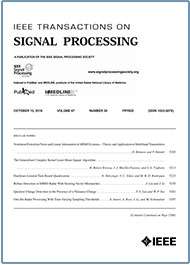- Our Story
- Publications & Resources
- Publications & Resources
- Publications
- IEEE Signal Processing Magazine
- IEEE Journal of Selected Topics in Signal Processing
- IEEE Signal Processing Letters
- IEEE Transactions on Computational Imaging
- IEEE Transactions on Image Processing
- IEEE Transactions on Information Forensics and Security
- IEEE Transactions on Multimedia
- IEEE Transactions on Signal and Information Processing over Networks
- IEEE Transactions on Signal Processing
- IEEE TCI
- IEEE TSIPN
- Data & Challenges
- Submit Manuscript
- Guidelines
- Information for Authors
- Special Issue Deadlines
- Overview Articles
- Top Accessed Articles
- SPS Newsletter
- SigPort
- SPS Resource Center
- Publications FAQ
- Blog
- News
- Dataset Papers
- Conferences & Events
- Community & Involvement
- Professional Development
- For Volunteers
- Information for Authors-OJSP
-
Home
Conferences Events IEEE Signal Processing Magazine IEEE SPL Article IEEE TIFS Article IEEE TMM Article IEEE TSP Article Jobs in Signal Processing Lectures Machine Learning Seasonal Schools Signal Processing News SPM Article SPS Distinguished Lectures SPS Newsletter Article SPS Webinar SPS Webinars SPS Webinar Series Webinar webinars
-
Our Story
What is Signal Processing?

The technology we use, and even rely on, in our everyday lives –computers, radios, video, cell phones – is enabled by signal processing. Learn More » -
Publications & Resources
-
SPS Resources
- Signal Processing Magazine The premier publication of the society.
- SPS Newsletter Monthly updates in Signal Processing
- SPS Resource Center Online library of tutorials, lectures, and presentations.
- SigPort Online repository for reports, papers, and more.
- SPS Feed The latest news, events, and more from the world of Signal Processing.
-
SPS Resources
-
Conferences & Events
-
Community & Involvement
-
Membership
- Join SPS The IEEE Signal Processing Magazine, Conference, Discounts, Awards, Collaborations, and more!
- Chapter Locator Find your local chapter and connect with fellow industry professionals, academics and students
- Women in Signal Processing Networking and engagement opportunities for women across signal processing disciplines
- Students Scholarships, conference discounts, travel grants, SP Cup, VIP Cup, 5-MICC
- Young Professionals Career development opportunities, networking
- Get Involved
-
Technical Committees
- Applied Signal Processing Systems
- Audio and Acoustic Signal Processing
- Bio Imaging and Signal Processing
- Computational Imaging
- Image Video and Multidimensional Signal Processing
- Information Forensics and Security
- Machine Learning for Signal Processing
- Multimedia Signal Processing
- Sensor Array and Multichannel
- Signal Processing for Communication and Networking
- Signal Processing Theory and Methods
- Speech and Language Processing
- Technical Working Groups
- More TC Resources
-
Membership
-
Professional Development
-
Professional Development
- Signal Processing Mentorship Academy (SigMA) Program
- Micro Mentoring Experience Program (MiME)
- Distinguished Lecturer Program
- Distinguished Lecturers
- Distinguished Lecturer Nominations
- Past Lecturers
- Distinguished Industry Speaker Program
- Distinguished Industry Speakers
- Distinguished Industry Speaker Nominations
- Industry Resources
- IEEE Training Materials
- Jobs in Signal Processing: IEEE Job Site
-
Career Resources
- SPS Education Program Educational content in signal processing and related fields.
- Distinguished Lecturer Program Chapters have access to educators and authors in the fields of Signal Processing
- Job Opportunities Signal Processing and Technical Committee specific job opportunities
- Job Submission Form Employers may submit opportunities in the area of Signal Processing.
-
Professional Development
-
For Volunteers
-
For Board & Committee Members
- Board Agenda/Minutes* Agendas, minutes and supporting documentation for Board and Committee Members
- SPS Directory* Directory of volunteers, society and division directory for Board and Committee Members.
- Membership Development Reports* Insight into the Society’s month-over-month and year-over-year growths and declines for Board and Committee Members
-
For Board & Committee Members
Popular Pages
Today's:
- IEEE Transactions on Information Forensics and Security
- Information for Authors
- (ICIP 2026) 2026 IEEE International Conference on Image Processing
- (ICIP 2025) 2025 IEEE International Conference on Image Processing
- Submit Your Papers for ICASSP 2026!
- Conferences Board
- Editorial Board Nominations
- TMM Special Issue - Visualization and Visual Analytics for Multimedia
- SPCOM TC Home
- Call for Papers for ICASSP 2026 Now Open!
- Join a Technical Committee
- Call for Proposals: (SLT 2026) 2026 IEEE Workshop on Spoken Language Technology
- Sketched Over-Parametrized Projected Gradient Descent for Sparse Spike Estimation
- Video & Image Processing Cup
- CI TC Home
All time:
- Information for Authors
- Submit a Manuscript
- IEEE Transactions on Image Processing
- IEEE Transactions on Information Forensics and Security
- IEEE Transactions on Multimedia
- IEEE Transactions on Audio, Speech and Language Processing
- IEEE Signal Processing Letters
- IEEE Transactions on Signal Processing
- Conferences & Events
- IEEE Journal of Selected Topics in Signal Processing
- Information for Authors-SPL
- Conference Call for Papers
- Signal Processing 101
- IEEE Signal Processing Magazine
- Guidelines
Last viewed:
- Volunteer Opportunities
- Women in Signal Processing
- Join a Technical Committee
- About Open Journal of Signal Processing
- IEEE Transactions on Audio, Speech and Language Processing
- (ISBI 2026) 2026 IEEE 23rd International Symposium on Biomedical Imaging
- Video & Image Processing Cup
- Occlusion-Aware Human Mesh Model-Based Gait Recognition
- Submit Your Papers for ICASSP 2026!
- SPCOM TC Home
- (ICIP 2025) 2025 IEEE International Conference on Image Processing
- (ICIP 2026) 2026 IEEE International Conference on Image Processing
- (ICME 2026) 2026 IEEE International Conference on Multimedia and Expo
- Call for Papers for ICASSP 2026 Now Open!
- (ICME 2025) 2025 IEEE International Conference on Multimedia and Expo
Tensor Completion from Regular Sub-Nyquist Samples
You are here
Transactions on Signal Processing
Publications & Resources
For Authors
Top Reasons to Join SPS Today!
1. IEEE Signal Processing Magazine
2. Signal Processing Digital Library*
3. Inside Signal Processing Newsletter
4. SPS Resource Center
5. Career advancement & recognition
6. Discounts on conferences and publications
7. Professional networking
8. Communities for students, young professionals, and women
9. Volunteer opportunities
10. Coming soon! PDH/CEU credits
Click here to learn more.
Tensor Completion from Regular Sub-Nyquist Samples
Signal sampling and reconstruction is a fundamental engineering task at the heart of signal processing. The celebrated Shannon-Nyquist theorem guarantees perfect signal reconstruction from uniform samples, obtained at a rate twice the maximum frequency present in the signal. Unfortunately a large number of signals of interest are far from being band-limited. This motivated research on reconstruction from sub-Nyquist samples, which mainly hinges on the use of random/incoherent sampling procedures. However, uniform or regular sampling is more appealing in practice and from the system design point of view, as it is far simpler to implement, and often necessary due to system constraints. In this work, we study regular sampling and reconstruction of three- or higher-dimensional signals (tensors). We show that reconstructing a tensor signal from regular samples is feasible. Under the proposed framework, the sample complexity is determined by the tensor rank-rather than the signal bandwidth. This result offers new perspectives for designing practical regular sampling patterns and systems for signals that are naturally tensors, e.g., images and video. For a concrete application, we show that functional magnetic resonance imaging (fMRI) acceleration is a tensor sampling problem, and design practical sampling schemes and an algorithmic framework to handle it. Numerical results show that our tensor sampling strategy accelerates the fMRI sampling process significantly without sacrificing reconstruction accuracy.
SPS Social Media
- IEEE SPS Facebook Page https://www.facebook.com/ieeeSPS
- IEEE SPS X Page https://x.com/IEEEsps
- IEEE SPS Instagram Page https://www.instagram.com/ieeesps/?hl=en
- IEEE SPS LinkedIn Page https://www.linkedin.com/company/ieeesps/
- IEEE SPS YouTube Channel https://www.youtube.com/ieeeSPS
Home | Sitemap | Contact | Accessibility | Nondiscrimination Policy | IEEE Ethics Reporting | IEEE Privacy Policy | Terms | Feedback
© Copyright 2025 IEEE - All rights reserved. Use of this website signifies your agreement to the IEEE Terms and Conditions.
A public charity, IEEE is the world's largest technical professional organization dedicated to advancing technology for the benefit of humanity.











